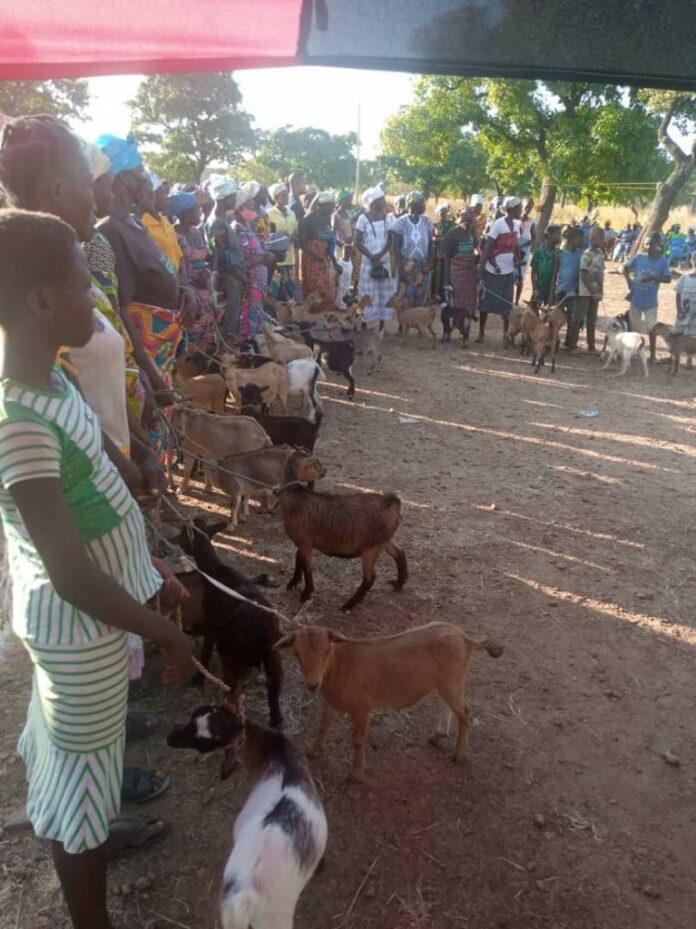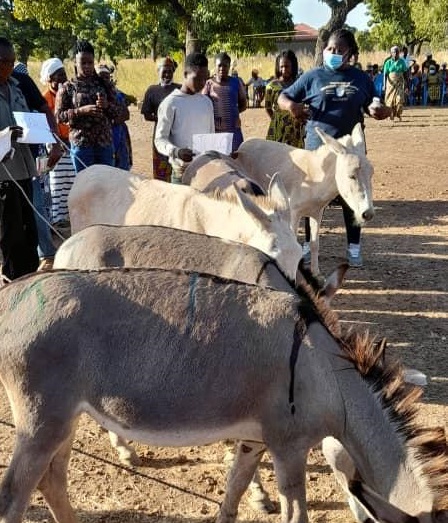
|
Getting your Trinity Audio player ready...
|
A number of poor women whose living condition is reported to have worsened in Nabdam, a deprived district in the Upper East Region, amid the devastating toll of the new coronavirus (COVID-19) pandemic on economies around the globe have been offered some livestock to rear to earn income.
The livestock— goats and donkeys— were provided by the Ghana Rural Opportunities for Women (GROW), a non-governmental organisation.
The organisation has been making such donations annually since 2008. But the latest one is targeted at those economically most crushed by COVID-19 in the district. The beneficiaries of this year’s presentation include 32 individuals and 5 women groups.
“For the past twelve years, we’ve been doing this. Yearly, we come along with items that will support these women to generate income to fight poverty. This year, thirty-two goats have been presented to vulnerable women to go and rear. They are expected to return female goats out of their mother goats so that other women can also have access to the support. There have been issues with COVID-19. Economic situation everywhere has been an issue and that doesn’t exclude these women. We are to support them fight poverty as it is always done every year.
“Five donkeys were also presented with donkey carts. All these years, we’ve been buying male donkeys. Last year, we decided to look at buying female donkeys so that that can also go a long way to support them when they also reproduce. The donkeys can help them carry farm produce, carry items to the market, carry building materials and a whole lot. They can rent out the donkeys with the carts and get income out of it. This will go a long way to help them to recover from the COVI-19 impact, to sustain them in the long term,” said the GROW’s Founder and Chief Executive Officer, Dr. Vida Nyagre Yakong.
“We have found our lost hope”— Relieved women speak
The assisted women did not lose any relatives to COVID-19. But they lost some helping hand. The usual support they were getting from remote sources ceased after the virus emerged and prompted a global panic and a lockdown that drew along far-reaching effects.
Although the rural women did not know how to spell the name of the unfamiliar virus. They did not even know how to pronounce the name. But they felt the crushing toll it brought upon every territory. The relief offered by the GROW was unexpected at the time hopes of recovery had gone missing.

“We are farmers. When we harvest, we have to carry them on our heads. Now, we have been given donkeys and donkey carts. Farming has been made easier for us because when we harvest, we can carry our produce back home on the carts. And we have been given goats to rear. With the rearing of the goats, we will use it to help our families. When our children need something at home or at school, we can sell the goats to cater for them.
“I remember the same GROW brought bicycles to this community some time ago for adults and schoolchildren and trained some of us how to ride. They distributed the bicycles among us the women and the men which some of us have been riding to our farms. The children ride theirs to their schools so they don’t have to walk a long distance to school as before. More importantly, the same organisation built a clinic for us where we go for healthcare services. It’s a lot of relief for us,” one of the supported women, Dompoka Zebire, said in Twi.
The annual donations made by the GROW in the district are done in collaboration with its donor partners at the University of British Colombia in Canada as well as other societies and development associates around the world.
“We have found our lost hope. Our children are relieved in so many ways. We the women are relieved so much by the latest support. And I must add that we used not to have an ambulance but the organisation has made it possible for us to have one at the clinic so that when a sick person is on referral, there is no delay,” Babugma Piibil, another beneficiary, told the press in the locally spoken Nabt.
By Edward Adeti, Upper East Region, Daily Mail GH




